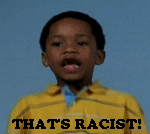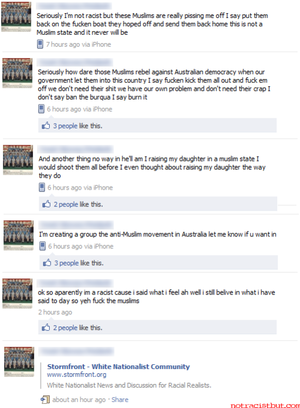I'm not a racist, but...
"I'm not a racist but..." has long been considered one of the most powerful clichés in the English language. It has the power to define people, cultures, and determine some of the most powerful philosophies that the world has ever seen.
It is generally used in an argumentative situation, to make a point that could potentially be otherwise taken in a negative concept. Similar examples are "I'm not a sexist, but I don't feel women deserve equal pay when they are only truly useful 26 out of 29 days." The statement is often a precursor to "petitio principi" (Latin for "It is because I said so").
In modern society there is an aversion to making a statement that may be considered as politically incorrect. This disarming preface has become a cliche due to its usefulness in stating what may be unpleasant or not politically correct. This statement is referred to by linguists as a "but-head" statement.
Deconstruction
To truly understand the strength of this statement the individual words must be taken into consideration:
- "I'm" or "I am" is the first part of the phrase. It defines the speaker as an individual. Often used in philosophy to show the existence of things. Descartes said "I think, therefore I am". Here Descartes both defines himself as a thinking individual, and as an individual. In the phrase in question though the speaker defines themselves as a non-thinking individual, and therefore negates his own existence even as he asserts it.
- "Not" immediately after the definition of self and the subsequent denial of existence, the speaker uses a negative. In Boolean Algebra, and all mathematical logic, the term "not" immediately reverses the meaning of everything going into it. So by defining themselves as a thinking/non-thinking existent/non-existant individual, they immediately negate it in total, and thereby make themselves into a non-individual. This can be viewed similarly to a member of a mob, who becomes no longer an individual within their own right, but simply a part of a greater whole. And in much the same way as a mob's intelligence as a whole is that of its least intelligent member, the speaker again shows the lowest possible calculation of intelligence.
- "A" The indefinite article. By using the word "a" instead of "the" the speaker then removes any definitiveness from their speech. Rather than being "the" racist, and therefore engendering some uniqueness, they become again just a part of a greater whole.
- "Racist" A person who is defined by their lack of understanding of other cultures and people. Variants on the saying substitute the words "sexist", "homophobe", or any number of phrases that could be used to describe an average Fox News presenter.
- "But..." is the ultimate word of justification and denial. When used in an argumentative tone it show that everything before it is incorrect. In the same way a person would say "I'm sorry, but it's your fault" which clearly means "I'm not sorry as you are to blame".
In this way anyone who says "I am not a racist, but..." is in fact showing that they are an unintelligent part of an amorphous mob of racists who feels that the mistakes that they make in their own life can be blamed on the stereotypical group that they then go on to spill their vitriol about.
Usage
The advantage of this argument, while pointing out that the person speaking is well and truly an imbecile and a racist, gives the speaker the illusion of not being racist. This allows said user to make statements that are offensive and derogatory, but all the while keeping a thin veneer of political correctness.
Common uses of the phrase are things like:
- "I'm not a racist, but I feel that there are too many black people moving into the area."
While this may be, on the face value, a quite peaceful statement, without the preface the statement becomes "There are too many black people moving into the area." This suggests that there may be something wrong with black people moving into the area. Given that the area in question may have cars with hubcaps that have significant resale value, this may in fact be a real issue.
- "I'm not a racist but I'm not going to vote for Barack Obama"
This statement in fact is intensified by the preface. Without it the statement would be "I'm not going to vote for Barack Obama." which in itself is a non-racist statement. The reason why the speaker here is prefacing the statement is because he is, in fact, not going to vote for Barack Obama based upon a racial prejudice. If he simply chose not to vote for Barack Obama as he is completely untrustworthy like so many others of his type, that wouldn't be a racist decision.
- "I'm not a racist but I don't feel responsible for slavery or Starbucks despite being a white American because I was born in 1993"
Racism is not just racism, racism is power and racism. Because white people are intrinsically powerful they may not choose what attributes are inherent to their race. These attributes may only be defined by people of the the majority races (not white). For example, all whites are responsible for slavery and Jim Crow, except elected members of the U.S. Democratic party. However it is irrational to take pride in anything a member of one's race did that positively effected the world as you did not do that. This is different from cultural identity, therefore it is acceptable to say "I'm proud the Jewish people invented the Polio vaccine" or "I'm proud that blacks produced such a fine form of music like Jazz" because "Jew" and "black" are cultural identities. "White" isn't an identity except to racists like the Klan or White Jesus, therefore it's irrational to state "I'm proud that white people invented the plunger."
However the usage could be much more subtle. Corollary to the statement is "I really do cherish black people, but..." where the speaker has started the statement by defining themselves as a victim of jungle fever, but is still aware that the smell of a black man is one that is difficult to wash out of your sheets.
But one of the most memorable examples of this is the speech by famed racist Martin Luther King where he states that he is not a racist, but he has a dream that black men and white men could sing together in the words of the old Negro spiritual. If he is indeed not a racist, why did he choose a Negro spiritual for white men to sing. And he was well aware that the black men would be able to sing it better and drown out the glorious tenor voices of the white men, whereas if the sung in the words of the old honky spiritual "Danny Boy", the Negroes would sound terrible in comparison.
In conclusion
The words "I'm not a racist, but..." reflect that the speaker is a racist, which means that they have irrational feelings towards people of another race. Now I'm not a racist, but the reality is that there are perfectly rational reasons to believe that whitey is superior, and that racism should be frowned upon.
See also
| Featured version: 28 April 2015 | |
| This article has been featured on the main page. — You can vote for or nominate your favourite articles at Uncyclopedia:VFH. | |



